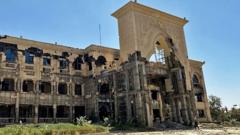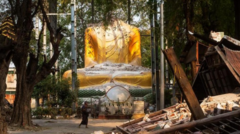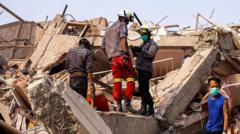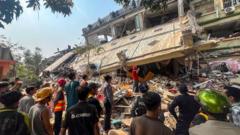As Myanmar grapples with the aftermath of a devastating earthquake, citizens are pondering whether this natural disaster signals the potential end of the military junta that has ruled for the past four years.
Myanmar Earthquake Sparks Speculation About Junta's Future

Myanmar Earthquake Sparks Speculation About Junta's Future
Recent earthquake brings to light rumors and omens in Myanmar regarding potential regime change.
The recent earthquake in Myanmar has claimed the lives of at least 1,000 individuals, while authorities fear the death toll may rise further. This disaster struck only a day after the military regime celebrated its 80th Armed Forces Day with a grand parade in Naypyidaw, the capital city constructed by previous military rulers. Amid this tragic event, people across Myanmar are engaging in deep speculation, questioning whether such a catastrophe is an omen that foretells the collapse of the current junta led by Min Aung Hlaing.
In a country where free speech is heavily suppressed, omens, and superstitions have become central to the discourse surrounding political events. The wave of uncertainty following the junta's ascension four years ago has pushed many to rely on folklore and astrological interpretations, resonating deeply with the local populace. Notably, the belief that an earthquake in March could lead to the downfall of rulers has gained traction following this latest disaster.
The earthquake has primarily affected urban centers, especially in Mandalay, Myanmar's second-largest city. Elderly residents like 89-year-old Daw Marlar Myint, who has experienced numerous natural disasters in the past, drew parallels between the earthquake's devastation and divine retribution for harsh governance. "A massive earthquake like this is nature’s way of punishing a cruel and corrupt ruler,” she expressed, underscoring the view that the junta's days may be numbered in the face of such calamity.
As Myanmar continues to face complex challenges—from civil unrest to natural disasters—the reflection on the potential demise of the ruling junta showcases the interplay of fate, superstition, and political sentiment in a nation where hope for change often collides with harsh realities. The unfolding situation remains a poignant reminder of the fragile balance between authority, belief, and the unpredictable forces of nature.
In a country where free speech is heavily suppressed, omens, and superstitions have become central to the discourse surrounding political events. The wave of uncertainty following the junta's ascension four years ago has pushed many to rely on folklore and astrological interpretations, resonating deeply with the local populace. Notably, the belief that an earthquake in March could lead to the downfall of rulers has gained traction following this latest disaster.
The earthquake has primarily affected urban centers, especially in Mandalay, Myanmar's second-largest city. Elderly residents like 89-year-old Daw Marlar Myint, who has experienced numerous natural disasters in the past, drew parallels between the earthquake's devastation and divine retribution for harsh governance. "A massive earthquake like this is nature’s way of punishing a cruel and corrupt ruler,” she expressed, underscoring the view that the junta's days may be numbered in the face of such calamity.
As Myanmar continues to face complex challenges—from civil unrest to natural disasters—the reflection on the potential demise of the ruling junta showcases the interplay of fate, superstition, and political sentiment in a nation where hope for change often collides with harsh realities. The unfolding situation remains a poignant reminder of the fragile balance between authority, belief, and the unpredictable forces of nature.























